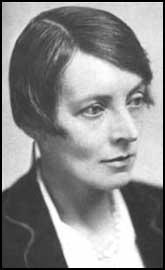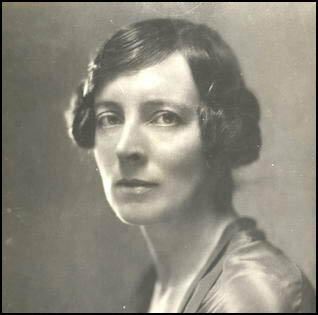Mary Hamilton

Mary Hamilton, the daughter of Robert Adamson and Daisy Duncan, was born on 8th July 1882. Robert Adamson came from a poor, working-class family, but he eventually became Professor of Logic and Metaphysics at Glasgow University. Mary's mother came from a Quaker family and had been one of the first women to become a student at Newnham College, Cambridge.
Robert and Daisy Adamson were both supporters of women's rights and were determined to raise their six children according to these principals. When Mary, the eldest daughter, had reached the age of eighteen, she was sent to Newnham College. At university she became friendly with Margery Corbett and together they joined the Cambridge branch of the National Union of Women Suffrage Societies (NUWSS). Mary spent many weekends at Margery's home in Danehill, Sussex, and was brought into contact with Marie Corbett, Cicely Corbett, and other committed feminists in Sussex.
Mary obtained a first class honours degree, and this enabled her to obtain a teaching post in the history department of the University College of South Wales. In 1905 she resigned her post after her marriage to a university colleague, Charles Hamilton.
Mary remained an active member of the NUWSS and after her conversion to socialism, she joined the Independent Labour Party. On the outbreak of the First World War, she joined the Union for Democratic Control and became active in the struggle for a negotiated peace.
In 1920 Lady Margaret Rhondda, founded the political magazine Time and Tide. Mary became one of the journal's main contributors. She also worked as a journalist for The Economist magazine and edited Review of Reviews with Philip Gibbs.
In 1923 General Election Mary Hamilton made her first attempt to enter House of Commons. After the passing of the Equal Franchise Act in 1928, which gave all women over the age of twenty-one the vote, it became easier for women to be selected as candidates in winnable constituencies.

In the 1929 General Election Hamilton became Labour MP for Blackburn. Mary Hamilton was appointed as Parliamentary Private Secretary to Clement Attlee, the Postmaster General in the Ramsey MacDonad government. Mary also served on the Royal Commission on the Civil Service where she argued strongly in favour of equal pay for men and women. Mary also became involved in the campaign to remove the marriage bar on women teachers.
Mary Hamilton, strongly opposed to the decision by Ramsay MacDonald to form a National Government. "But greatly as I admire your courage, and ready as I am to believe your gesture may have saved us all, I could not, as I thought the whole situation out on my long journey home, find it possible to support this Government or believe in its policy. It is a very hard decision to make; and this afternoon's party meeting does not make it agreeable to act on - but, there it is. I felt I must write this line to express the deep regret I feel about this, temporary severance between you and the party."
After her defeat in the 1931 General Election, Hamilton remained in public life. Mary was a governor of the BBC (1932-1936) and a member of the London County Council (1937-1940).
During the Second World War Hamilton was head of the American Division of the Ministry of Information. Hamilton also wrote biographies of important labour figures such as Margaret Bondfield and Arthur Henderson.
Mary Hamilton died on 10th February, 1966.
Primary Sources
(1) When Mary Hamilton was in her fifties she wrote about her early life in her book Remembering Good Friends (1944). Mary was very close to her parents who were both supporters of equal rights. Mary's father taught at Glasgow University.
Students came to consult him on every sort of matter - personal troubles and problems, as well as difficulties in their work. I used sometimes to be curled up, unobserved, on the deep window seat in the study, half-hidden by the heavy curtains, when they came to talk to him. He made them talk; 'sort out' their problems. He said once: 'You can't give anybody advice as to what he should do. That is his freedom, and his responsibility. But you can help him to set out the pieces, so that he can see what his choice is.'
(2) Henry and Eleanor Sidgwick set up Newnham College, Cambridge, in 1880. Mary Hamilton wrote about her experience at Newnham College in the early 1900s in her book, Remembering Good Friends (1944).
Eleanor Sidgwick and Henry Sidgwick had, throughout their life together, chosen to give their time to college. She had renounced mathematical research of a very high order in order to come and assist Miss Clough in the early days. Early in their married life, which was a perfect partnership, they gave up their own home to come and live in Newnham… They enjoyed the triumph of 1881 in the passing of the Senate of the Graces admitting women to the right of sitting for Tripos examinations and being placed on the lists, the struggle for full recognition - the granting of degrees, and admission to membership of the University was entering on a long, slow phase, with no end in sight. (It was in fact to take forty years and a world war to persuade the authorities to grant degrees to women.)
Eleanor Sidgwick was principal of Newnham College in my time at Cambridge (Henry Sidgwick died in 1900). A tall, slightly bent, emaciated figure; tenuous, yet not fragile.
A white face, with snowy hair covered by a delicate fragment of lace. Then, as she passed, she smiled; the eyes went blue and the face was, suddenly, changed to a poignant beauty. How could anyone take Newnham and the fact of being there for granted, while she was there, who had helped to wring its being out of such resistance.
Newnham College was still on trial, and the authorities were uneasily conscious of the fact. Hence total separation from the masculine undergraduate population, which most of us did not feel or resent at the time, but any contemporary student must find odd, even inexplicable. Hence the timid restrictions that irked and offended students.
(3) When Mary Hamilton was at Newnham College she used to stay with her fellow student, Margery Corbett at her home at Danehill, Sussex. Mary Hamilton wrote about these experiences in her book Remembering Good Friends (1944).
Margery's mother, Marie Corbett, was an ardent Feminist, one small external sign being the fact that she regularly wore the breeches she had taken to when bicycling came in, at least a decade before war-time made them permissible. She was a woman of great drive, active in local affairs and local government and all good causes. The house was apt to swarm with people. The Corbett's hospitality was in the best English tradition. Friends of Margery, of her younger sister Cicely - extravagantly pretty, and at the time we were at Cambridge, preparing to go Oxford and of her elder brother Adrian, then at Oxford, assembled for dances and week-end parties…. At college Margery was intensely keen on civil liberties, free trade, international good will, democracy… She spends time and energy without stint or personal ambition… She has an immense sense of duty, and must have spent a very large part of her entire life on committees and at meetings. Not to like her is and always has been impossible; she has charm and complete sincerity, and has made a success of life, in its essential relationships. She was a good daughter: she is a good wife and mother. The one boy, born during the 1914 war, when his father was in France with the B.E.F., was, as a baby, so delicate that it did not seem possible he should live; Margery insisted that he should; he has grown up a superb physical specimen.
(4) Mary Hamilton wrote about her memories of the outbreak of the First World War in her autobiography, Remembering Good Friends (1944).
Within weeks, horror was fully upon us. That war means the massive, selective slaughter, the killing, maiming, blinding, shell-shocking of men was a fact no one could refuse to see. Daily vast convoys of wounded arrived; the hospitals were crowded; the casualty lists filled columns of small print, as the flower of our young manhood was annihilated.

